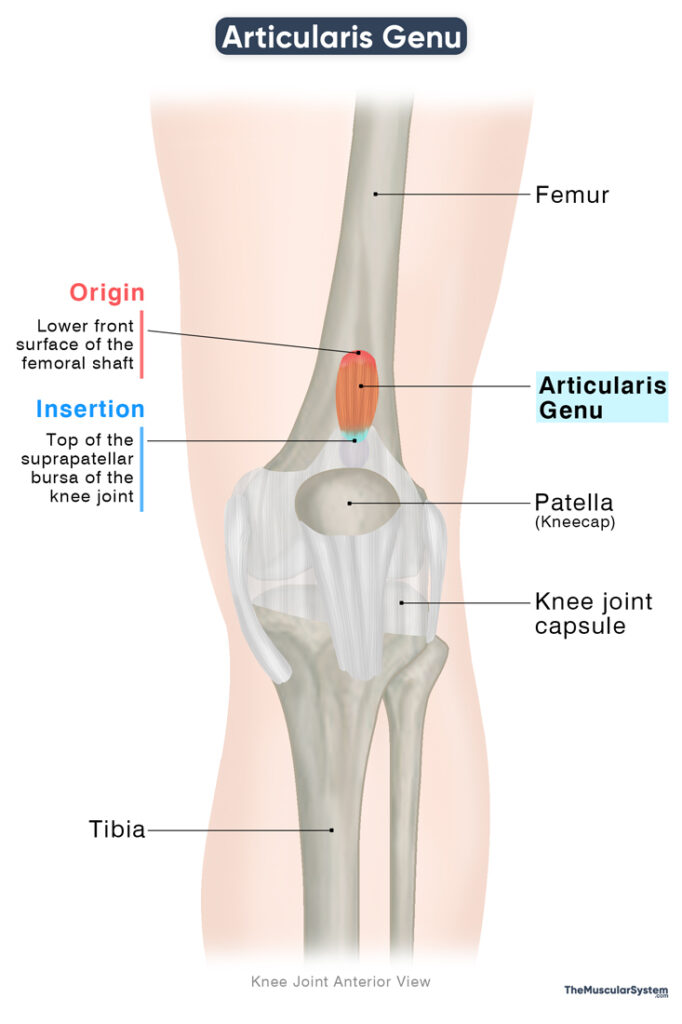Articularis Genu
Last updated:
23/07/2025Della Barnes, an MS Anatomy graduate, blends medical research with accessible writing, simplifying complex anatomy for a better understanding and appreciation of human anatomy.
What is the Articularis Genu
The articularis genu, also known as articularis genus, is a small flat muscle at the front of the lower thigh, just above the kneecap. It helps stabilize the knee joint by pulling at it from above when the knee is extended.
Anatomy
Location and Attachments
| Origin | Lower front of the femoral shaft (body) |
| Insertion | The suprapatellar bursa of the knee joint |
Origin
It originates from the anterior surface of the distal femur, typically arising from the lower one-third of the shaft of the femur above the knee joint. The muscle belly usually consists of several distinct muscular bundles that may arise from various points within this region. It gives the muscle a layered appearance.
Insertion
The muscle fibers descend vertically to insert into the upper part of the synovial membrane and the superior surface of the suprapatellar bursa, a fluid-filled sac located on the anterior surface of the femur just above the patella.
Relations With Surrounding Muscles and Structures
The articularis genu is a small band of muscle that lies above the knee joint, deep to the vastus intermedius, one of the four muscles that form the quadriceps femoris muscle group of the anterior thigh. Although the two muscles are usually distinguishable, their fibers or tendons may sometimes blend, making them appear as a single structure.
Function
| Action | Pulling the suprapatellar bursa upwards when the knee is extended |
Due to its small size, the muscle often works together with the vastus intermedius rather than independently. It has a protective function: it pulls the suprapatellar bursa upward and away from the knee joint space during knee extension, so the bursa does not get impinged. It ensures smooth movement of the knee.
Antagonists
Since the muscle’s function is primarily protective rather than producing movement, it does not have any antagonists opposing its action.
Innervation
| Nerve | Femoral nerve (L2-L4) |
The muscle is innervated by the posterior division of the femoral nerve, which arises from the 2nd to 4th lumbar nerves (L2–L4).
Blood Supply
| Artery | Lateral circumflex femoral artery |
The blood supply to the muscle comes from the lateral circumflex femoral artery, a branch of the deep femoral artery, which in turn arises from the femoral artery.
References
- Articularis Genus Muscle: Elsevier.com
- Articularis Genu Muscle: Radiopaedia.org
- Articularis Genu: BrookbushInstitute.com
- Articularis Genu: Meddean.LUC.edu
- The Anatomy of the Articularis Genus Muscle and Its Relation to the Extensor Apparatus of the Knee: PMC.NCBI.NLM.NIH.gov
- Articularis Genu Muscle: GPNotebook.com
Della Barnes, an MS Anatomy graduate, blends medical research with accessible writing, simplifying complex anatomy for a better understanding and appreciation of human anatomy.
- Latest Posts by Della Barnes, MS Anatomy
-
Thyrohyoid
- -
Suprahyoid Muscles
- -
Geniohyoid
- All Posts






